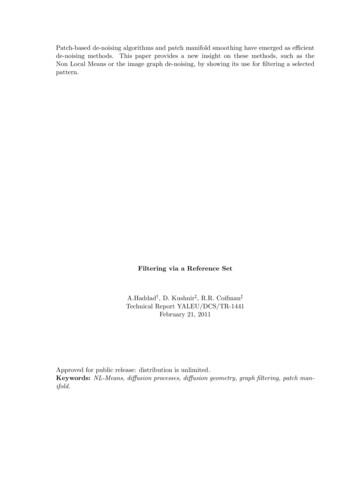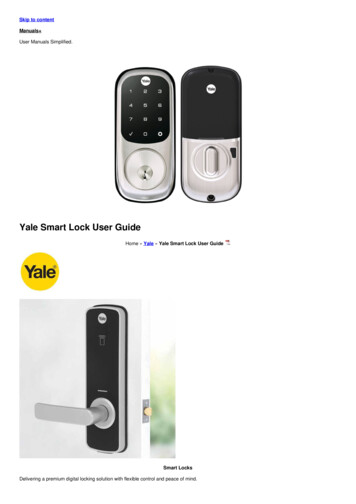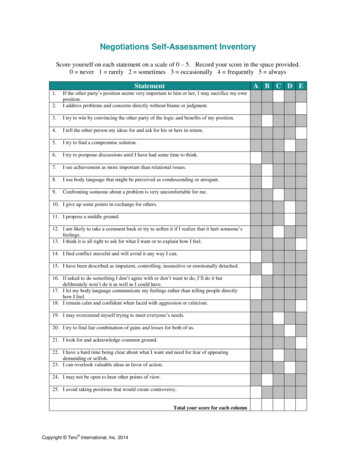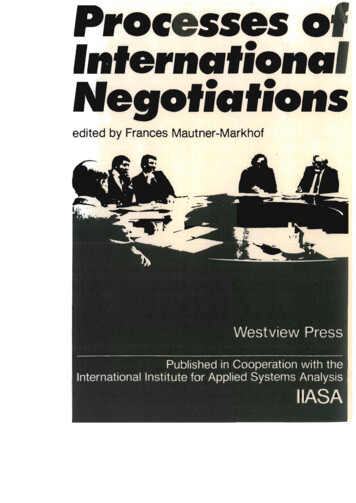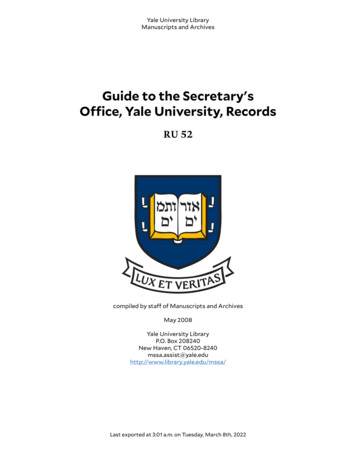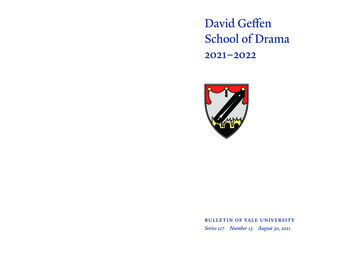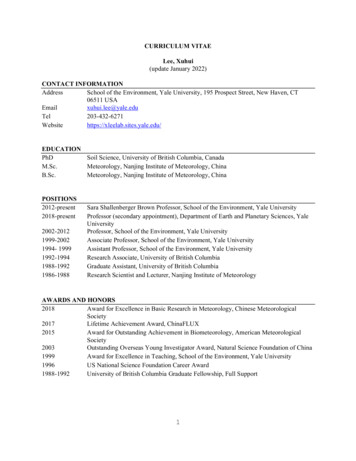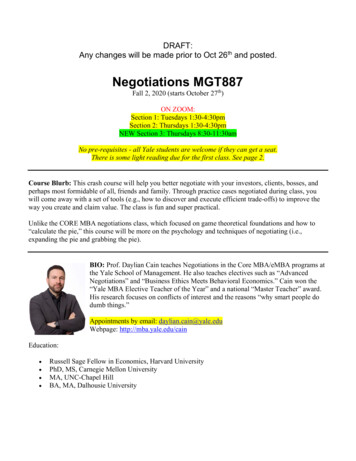
Transcription
DRAFT:Any changes will be made prior to Oct 26th and posted.Negotiations MGT887Fall 2, 2020 (starts October 27th)ON ZOOM:Section 1: Tuesdays 1:30-4:30pmSection 2: Thursdays 1:30-4:30pmNEW Section 3: Thursdays 8:30-11:30amNo pre-requisites - all Yale students are welcome if they can get a seat.There is some light reading due for the first class. See page 2.Course Blurb: This crash course will help you better negotiate with your investors, clients, bosses, andperhaps most formidable of all, friends and family. Through practice cases negotiated during class, youwill come away with a set of tools (e.g., how to discover and execute efficient trade-offs) to improve theway you create and claim value. The class is fun and super practical.Unlike the CORE MBA negotiations class, which focused on game theoretical foundations and how to“calculate the pie,” this course will be more on the psychology and techniques of negotiating (i.e.,expanding the pie and grabbing the pie).BIO: Prof. Daylian Cain teaches Negotiations in the Core MBA/eMBA programs atthe Yale School of Management. He also teaches electives such as “AdvancedNegotiations” and “Business Ethics Meets Behavioral Economics.” Cain won the“Yale MBA Elective Teacher of the Year” and a national “Master Teacher” award.His research focuses on conflicts of interest and the reasons “why smart people dodumb things.”Appointments by email: daylian.cain@yale.eduWebpage: http://mba.yale.edu/cainEducation: Russell Sage Fellow in Economics, Harvard UniversityPhD, MS, Carnegie Mellon UniversityMA, UNC-Chapel HillBA, MA, Dalhousie University
TEXT: Negotiation Genius (on Amazon and Audible Audiobooks)Reading the text will provide a significant advantage over your classmateswhen you negotiate against them. You may want to read the whole book, but atleast read the first three chapters as suggested in the schedule below. Your finaljournal should provide proof that you read these three chapters. As a result,you might as well use this incentivized opportunity to invest in yournegotiations skills ahead of time.
TopicSession #1IntroductionClaiming ValueSession #2Session #3More hagglingValue CreationClass ScheduleCaseHaggling Case(negotiate duringclass—in ZOOMbreakout rooms)This is a simple, ungraded case whereyou haggle on price. Prior to firstclass: Read chapter 1 (pp. 15-49).Sweet Deals(negotiate duringclass)Prior to class: Read chapter 2. (pp. 5082).Broadway(negotiate beforeclass)Prior to class: Read chapter 3 (pp. 83102). Video comments (see page 4)are due Friday, Nov. 13th.Non-SOM students:Watch Intro Videos (next page).Optional but probably helpful: Thinkthrough a planning document (see lastpage) for any case that you want to dowell on.If you want to read ahead or exploreother sources, future topics willinclude “logrolling,” “contingentagreements,” “post-settlementsettlements,” “deception and liedetection,” “coalitions,” “concessions,”“threats,” “integrative bargaining,”and more.Session #4Job NegotiationsJob Case(negotiate beforeclass)This case counts double, so prepwisely.Session #5CoalitionsCoalition Case(negotiate beforeclass)Optional reading: Google “Shapleyvalue,” or Wikipedia’s “Airportproblem,” or “Shapley Shubik PowerIndex.”Session #6Principals/AgentsHouses CaseTBAThis case counts no more than half theusual, because it is complicated andhas high variance in outcomes.Session #7Buying a CarCar Case(negotiate duringclass)After the last class, there is a reflectioncase to negotiate and write about.More info TBA.
Just for Non SOMers, or anyone who missed Core Negotiations with Barry and Daylian:Intro Videos to watch before session #1 These videos were created by Barry Nalebuff, a negotiation genius who I often co-teach with at Yale. Heoffers a nice framework for the course:1. Watch “Introduction” video (5- ‐minutes).Depending on your comfort and familiarity with the material, this and other videos mightbe watched at 1.25x or 1.5x speed.2. Watch “BATNA” video (7- ‐minutes).3. Watch “Why You Should Ask” video (8- ‐minutes).a. How much was Shuang risking when he turned down the initial 500/day offer? 500/day 300/day 200/dayNothingb. How much did Shuang improve his result though his negotiation (both indollars and in percentage terms)?A Framework for Negotiation4. Watch video “What is the Pie” (6 minutes).Takeaway: The pie is how much more two parties, A and B, can achieve by working together thanthey can obtain if they don't reach an agreement. In more technical terms, the pie net benefit fromworking together – (A’s net benefit on its own B’s net benefit on its own) where net benefit is thebenefit leftover after costs.5. Watch “Things go better with Coke” video (7 minutes).
Course Requirements:Negotiation Performance (50% of grade)For the scorable negotiations, we will compute your standardized score into a grade that represents howwell you did in comparison to others in your same role. The first case will not count.Reflection Case (25% of grade)After the last class, you will be given a case to negotiate with a partner, and instead of the case resultsbeing scored, you will hand in a short journal of your experiences. The journal should prove that you readthe first three chapters of Negotiation Genius and that you payed attention in class. More info TBA.Class Reputation (15% of grade)Your class reputation is built from the professor’s perception of your participation, preparation, andattendance as well as what your negotiation partners think of you. On most of the negotiation cases, yourpartner will rate your performance and how professional you were during the cases. Students will alsoelect classmates for “Most Prepared,” “Most Ethical,” and other categories that can improve this grade.Finally, at the end of the course, classmates will have a handful of reputation bonuses/penalties todistribute to prior partners. Lying about your alternatives in the case (e.g., fabricating outside offers) isstrongly discouraged; although, you may refuse to reveal your alternatives. Liars are often punished bypeers in reputation scoring, but I also reserve the right to punish liars through this reputation score.Video comments on negotiation expert’s tips (10% of grade, due on Canvas by Nov 7th)1) Watch this 45-minute video on “Deepak’s 22 Negotiation ne page: List your favorite five negotiation tweaks and write a paragraph on your most favorite.(If you disagree with something, write a sentence or two about that also.)2) OR: Watch this 60-minute video on “HBS Negotiating your job offer”http://tinyurl.com/deepak-negOne page: List your favorite five job negotiating tips and write a paragraph on your most favorite.(If you disagree with something, write a sentence or two about that also.)Other items:Contact Prof. Cain at least 48 hours before the class if you must be late for the negotiation (we may needto rearrange negotiator pairings).Don’t do things that would get you fired if the case were real life. Limit the dishonesty (we will discussthis at length), and don’t go beyond your budget limits.Settling a deal that is worse than your BATNA (best alternative to a negotiated agreement), i.e., goingbeyond your case-stated bottom line, will cost you an automatic 10% course-grade penalty. Doing thiswill probably put you into the lowest part of the curve and may risk incurring severe problems for yourgrade. In turn, always have a clear sense of your bottom line before you negotiate, and never go beyondyour limits. If your maximum budget in a case is 50K, do not pay 51K (e.g., not 50K today and 1K in thefuture); it is just that simple. Even smart people sometimes suffer “brainlock” in the heat of battle, so makesure this isn’t you.
FOR YOU OWN USE: BASIC NEGOTIATION PLANSWherever unsure below, make some estimate (if possible) and describe how you can get better intel.What are the issues in the negotiation? Quantify their value to you and then order them from biggest to smallest.Label them as “C” (common interests) or “WL” (pure win-lose interests) or “T” (wise tradeoffs: valuable to one side,cheaper to the other).What is your BATNA (Best Alternative To a Negotiated Agreement with this partner)?Your reservation price (i.e., your hard-line walk-away price/terms)?Your reasonable but optimistic target price/terms?What does an ideal deal look like to you?What issues are probably most important (top-3) to your opponent?Estimate: What is your opponent’s BATNA? Reservation price? Target?What are your sources of power?What are your opponent’s sources of power, and how can you neutralize them?What are likely problems that you might face? How can you avoid them? How can you recover if you fail to avoid them?What is your opening move/initial strategy?What are things that might be “valuable to you but cheap to them” (and vice versa)?What are issues that might tempt either side to compromise their own ethical values? Can you protect against this?What is the pie is here? What does getting half the pie look like to you to them? How can you expand/claim pie?
Prof. Daylian Cain teaches Negotiations in the Core MBA/eMBA programs at the Yale School of Management. He also teaches electives such as "Advanced Negotiations" and "Business Ethics Meets Behavioral Economics." Cain won the "Yale MBA Elective Teacher of the Year" and a national "Master Teacher" award.

